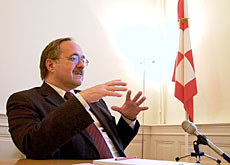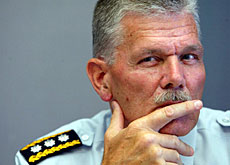Schmid aims to bring politics to the people

This year’s Swiss president, Samuel Schmid, says he intends to engage the public and to make politics more relevant to ordinary people.
In an interview with swissinfo, he talks about the concerns of the Swiss, reforms in the army, and what the United Nations “Year of Sport” means for Switzerland.
Schmid retains his portfolio as minister for defence and sport during his year in the rotating office of Swiss president.
Schmid is from the Bern wing of the rightwing Swiss People’s Party, and is regarded as a political moderate. His party is represented by two ministers in Switzerland’s seven-member cabinet – the other is Christoph Blocher.
swissinfo: You are Swiss president for the first time in 2005. Are you looking forward to it?
Samuel Schmid: Yes, very much so – I have a great deal of respect for this role. It’s a real challenge because much uncertainty lies ahead.
swissinfo: What is your focus going to be?
S.S.: My main objectives are to improve the working of the cabinet and at the same time strengthen the relationship between the public and the government.
I will also have to balance the needs of my own ministry with my additional role as president.
swissinfo: Do you have a motto for 2005?
S.S.: “Meeting 2005!” I want to visit all the 26 cantons, talk to the people, and understand them and their concerns.
All public sector organisations are there to provide a service to the people of our society. The complexity of the political process can often alienate people and that’s why it is vital to build a basis of trust.
swissinfo: What are the main concerns of the Swiss population?
S.S.: Their concerns are influenced by the issues and events of the day. Most of the population are concerned about the state’s limited room for manoeuvre because of financial constraints and also the rising costs of healthcare.
Many people are worried about whether the social welfare state can be preserved in the future.
swissinfo: Worries about terrorism are also prevalent in Switzerland, as evidenced by the debate over Islam. What can be done about that?
S.S.: These concerns are justified and everything possible must be done to prevent attacks.
But it’s important not to be hysterical about the dangers. We live in a relatively peaceful society and we don’t need to be live in fear for our lives on a daily basis, unlike people in some other unfortunate societies.
Dealing with the threat of terror is the responsibility of the secret service, the police and the law. The army would become involved very quickly if necessary.
swissinfo: The Netherlands has seen an outbreak of violence following the murder of the filmmaker, Theo van Gogh. Could this happen in Switzerland?
S.S.: These things could happen in any country. Even if we were not focused on the dangers of terrorism, we are a part of the world and this way of waging war has no respect for national boundaries. So we are also a part of this.
swissinfo: As president, what messages are you going to be sending to the rest of the world, and particularly to the Swiss living abroad?
S.S.: The Swiss abroad remain important ambassadors for our country, and we want to preserve those ties.
On my visits abroad I want to demonstrate that, although Switzerland has chosen its own way, it is not isolating itself. Switzerland is engaged internationally and is making a contribution to peace.
swissinfo: The Swiss army is seen as being in crisis. How do you, as defence minister, see the future of the army?
S.S.: It’s not correct that the army is in crisis. I am astonished that one speaks of it being in crisis, when there are so many countries, including on this continent, which are reforming the military.
Like other countries, we have reduced the size of our army, and adapted to the new security and political situation. But no country has said that its army is unnecessary. Quite the contrary; the threats facing countries have changed, and we have to change our tactics to reflect that, but without diminishing our security.
The Swiss army will not become a professional force – it will remain a militia army. We need a strong militia army to deal with the new threats we face.
swissinfo: Your party – the People’s Party – has criticised the reforms in the army and is also opposed to sending Swiss troops abroad? Doesn’t this get on your nerves?
S.S.: I listen to criticism. But as long as I am convinced that my decisions are correct, I press ahead.
In politics, you need a thick skin. It’s a shame that so many good men and women are no longer interested in politics because of the tough climate.
swissinfo: The United Nations has designated 2005 as the “Year of Sport”. As sports minister, what does this mean to you?
S.S.: It’s certainly a good initiative by the UN to give an impetus to sport. In Switzerland, we have numerous activities planned, and these are part of a federal initiative to get the Swiss to become more active.
swissinfo: Your predecessor, Adolf Ogi, initiated the Year of Sport. Can Switzerland expect to see some benefit?
S.S.: Adolf Ogi represents Switzerland, even though he is in the first instance a special UN representative. I think both Switzerland and the UN will benefit from the Year of Sport.
swissinfo: What would you like to look back on with pride at the end of this year?
S.S.: I hope that we succeed in our efforts to make the Swiss more active. And I hope that the doping scandals that have plagued some Swiss athletes are no longer an issue. And I hope that we will see strong economic growth.
The cabinet will this year ask the Swiss to approve a second set of bilateral accords with the European Union. In that I hope we are successful!
swissinfo-interview
The interview was conducted before last week’s earthquake in southeast Asia.
Samuel Schmid, 57, is a lawyer and notary.
He was a parliamentarian in the House of Representatives from 1982 to 1993, and a Senator from 1999 to 2000.
Parliament elected him to the cabinet on December 2, 2000, against the will of his own party.
He is minister of defence and sport.

In compliance with the JTI standards
More: SWI swissinfo.ch certified by the Journalism Trust Initiative











You can find an overview of ongoing debates with our journalists here . Please join us!
If you want to start a conversation about a topic raised in this article or want to report factual errors, email us at english@swissinfo.ch.